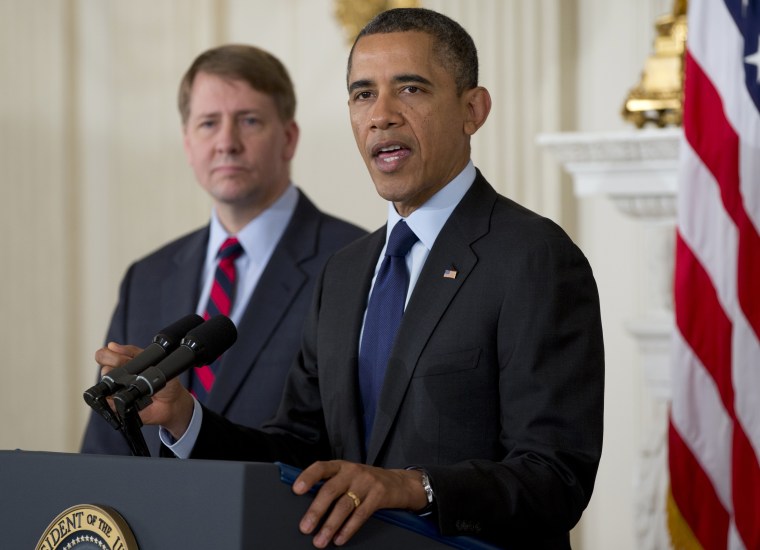Politically speaking, Senate Majority Leader Harry Reid had a small window at the beginning of this new Congress to reform the way filibusters are handled. You'd think he'd have been uncompromising, considering the Republican abuse of the practice that ran rampant during President Obama's first term. You'd be wrong.
Senate Republican leader Mitch McConnell and 42 other senators sent a letter Friday to Obama pledging to oppose any nominee to head the Consumer Financial Protection Bureau, alleging that it has little accountability to Congress and wields too much regulatory authority. There already is a nominee--Richard Cordray, who was renominated by President Obama last week. Cordray already leads the agency, thanks to a recess appointment last year that became necessary when Republicans blocked Cordray's nomination.
Adam Serwer of Mother Jones outlined the ransom Republicans want from the president before they allow any nominee to pass:
Senate Republicans want three big changes before they'll stop blocking Cordray. First, they want the CPFB to be by Congress rather than the Federal Reserve. Subjecting the bureau to the congressional appropriations process would compromise its political independence. Second, Republicans want the range of financial institutions the bureau has authority to regulate narrowed. This would leave unsupervised some of the problematic institutions the bureau was created to regulate. Finally, the GOP is demanding that other bank regulators—the same ones who failed to prevent the 2008 financial meltdown—be allowed to chaperone the CFPB by "verifying" that its rules "would not harm the safety and soundness of banks."This would let regulators who turned a blind eye to exploitative practices in the past because they were profitable tell the CFPB what to do—and the more different regulators have to approve of a rule, the more convoluted and less effective it is likely to be.
Joining PoliticsNation with Al Sharpton to discuss this last night was fellow msnbc host, Melissa Harris-Perry. She argued that this attempt to de-fang the CFPB was really all about redirection of blame away from Wall Street. "The thing that caused the economic crash in 2008--the home values, the evaporation of wealth, the loss of jobs--were the decisions made by those one-percenters on Wall Street," said the host of Melissa Harris-Perry. "And what happened is they redirected, they changed the conversation so that suddenly we'd be worried about the deficit instead of worried about Wall Street."
Harris-Perry went on to add that it goes beyond blame, since the havoc wrought by Wall Street has real consequences on the ground for a select few. "These are governors, local administrators, even mayors who are cutting their city and state and budgets," she said. "What we know is in 2010, we had a huge overtake of these gubernatorial positions by Republicans who are cutting these government jobs, often jobs that provided an opportunity to lift into the working class, so many people, including people of color."
See the entire segment below.
